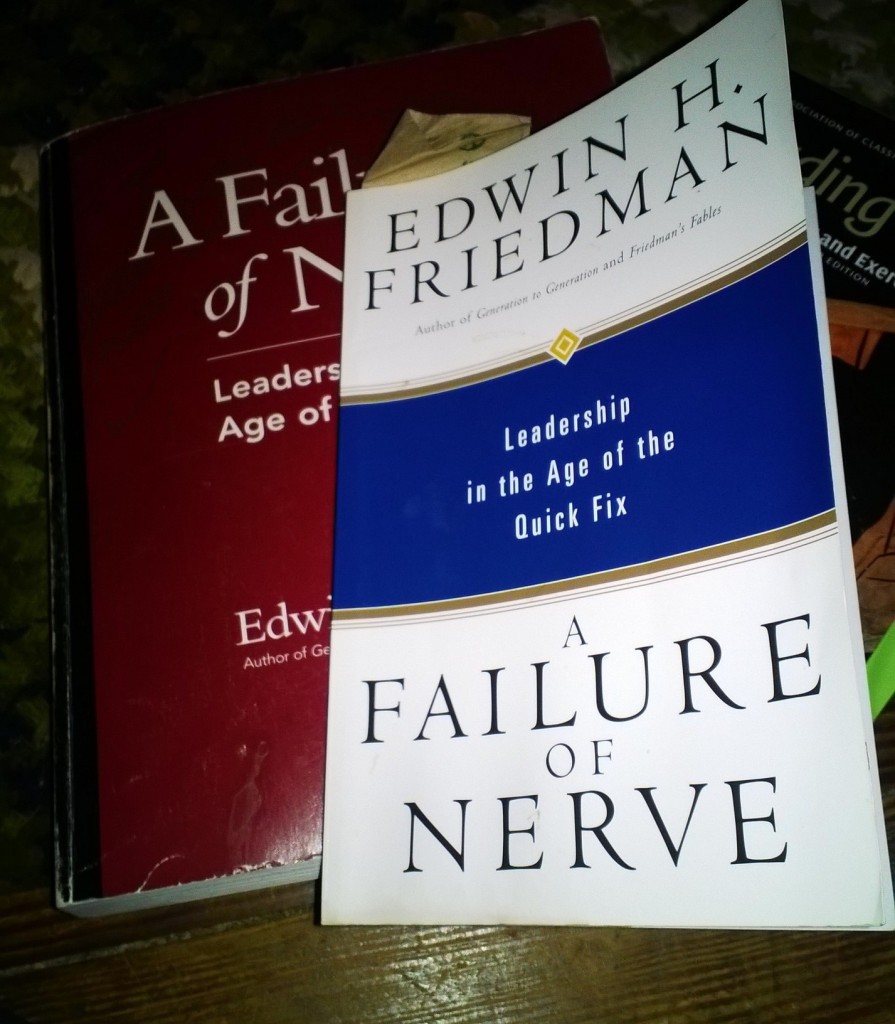I have been thinking a lot about the ideas of Ed Friedman lately.
I purchased his last incomplete book in its 1999 “edited manuscript” version published a few years after his death. Then, a later version came out in 2007. Here is a pic of my two copies of this book, both of which I have read and studied.
Yesterday I was wondering what he would make of the hyper anxiety and stuckness of our society almost twenty years after his death. Also I think I am watching the emotional system at my job unravel a bit.
In his theory, Friedman defines emotions not as feelings but as the basic instinctual responses built into the lizard part of our brains. He loves to pull his metaphors or wisdom from natural science. He compares the persistence of multi-generational emotional patterns to the way trees regenerate year after year.

“Persistence of form” or “power of the past” are two names Friedman uses for this phenomenon. “Trees teach us … the the connection between generations of living things is more like an infinitely-long collapsing telescope in which each generation to some extent overlaps the next, thereby contributing in a significant way to its form and shape. This understanding of the connection between generations in this way can be very useful for leaders.”

It’s important to understand that unlike most self-help books, Friedman is defining leadership much broader than business or politics to include parents, teachers, spouses, and almost any human as they live their lives seeking integrity.

When we try to fix problems in our situation, we often resort to changes that can be described as technical, administrative, or managerial, Friedman says. He points out that these activities are most of what “advice” consists of…. Rogerian listening says that when we advise others we are often blocking them from their own insights.

“Unless structural changes are accompanied by changes in an institution’s multigenerational emotional processes, they will almost always regress.”

This quote from Friedman seems to me to apply to my church’s situation as well as the society at large. We are in full scale regression and we constantly “adapt to our most immature members” in Friedman’s language.
This adaptation looks like this: “the widespread triumph of data over maturity, technique over stamina, and empathy over personal responsibility.”
Instead family system thinking emphasizes strength, not pathology, challenge not comfort, self-differentiation not herding for togetherness.
[All the ideas and quotes come from Friedman, I have added the emphasis]
China’s Fear of Women With Pamphlets – NYT
Speaking of stuckness.
Tomas Transtromer, Nobel-Winning Poet, Dies at 83 – NYTimes.com
Transtromer seems to have been an important Swedish poet and leader. I’ve never heard of him, but will definitely look up some of his work.
Which Companies Are Buying the Election? – NYTimes.com
Our government continues to keep secret its funding from the public. Sick stuff.
AMBER ALERT CANCELLED: 6-Year-Old Child Found
It was with relief that I found this online yesterday. I still maintain that this kind of focus is not healthy for our society. Not sure exactly how it should be done but judging from the hysterical comments I read on Facebooger, we are a mess.
Mother-Daughter Duo’s Photo Project Features 5-Year-Old as Iconic Black Women
Speaking of child focus, I’m ambivalent about this project. I love the idea that the child is dressing up as historical figures. But I wonder about the stage parent disease aspect of the deal.


Its David. I feel compelled to reply and please be advised that the majority is just my opion. =^)
With respect to the Amber Alerts, it is my opinion that they are an invaluable tool for local small-scale law enforcement as well as overly populated metropolitan areas regardless of media sensationalism, misinterpretation or human emotional regressive theories.
The basic idea behind them is to give those in search of someone who is either presumed or actually missing a lengthier reach in a timely manner. The alerts are also geared towards safely finding and returning the person in the most efficient and effective manner utilizing the most resources available e.g. phone alerts, texts, billboards, television and social media.
When I think of the criminological aspect of this and those detecting or policing this issues, I am reminded that the more time that elapses post crime, the less likely (statistically) that there will be a positive outcome or that the crime will be solved.
This is why I have this alert on my phone and pay attention to road signs when they arise or other media sources that utilize the alerts. I would presume it is most effectively used in both rural and urban areas specifically places like Southern California that is overly populated or the farmlands of the Midwest that are sparse in terms of resources for such situations. But if I can assist by basically being aware of my surroundings than I believe it is my civic duty to be involved if only to be aware.
Basically, I care about others regardless of what else is going on. And recently there are a lot of people behaving poorly around me both related and unrelated.
This does not make me loose sight of my belief that people are not inherently evil, but rather, intrinsically good. My belief is that people learn poor behaviors and a good example is when I used to counsel families. I would have families come into my office and after some time find out that the parents would be under the impression that they have a “bad kid” and that they literally would want to get rid of him/her (very unfortunate but it happens). So my job would be to educate them about the familial dynamics, systems, child development and emphasize that “there is no such thing as a bad kid, only kids that have learned to exhibit bad behaviors.” Of course this would sometimes upset the parents and they would become defensive and we would have to work through it. Other times, albeit rarely, this was reassuring and parents quickly got on board with helping the family heal.
All that to say, I care about others so if I can help in any small way when an alert is sent out, than I have no problem with it and most often ignore the fear mongering, ridiculous media’s exaggerating ignorance or the mainstream regression into an “immature” state (not to sound hypocritical, but i, like the rest of the world am guilty of regressing into my own immature state, but lets not go there).
Hows that for food for thought?
David
David, thanks for sharing your thoughts about AMBER alerts. I share your concern for others and paid attention to this alert enough to keep googling for follow up on the missing kid. For what it’s worth, I also think that Friedman is on to something with his idea of “child -focus” being an example of emotional regression in our society. In his thinking, we each of us do the most to help each other when we focus on our own individuation and functioning. He pointed to the warning on airplane oxygen masks as containing this same wisdom when it says: “Put own your own oxygen mask first before assisting others.”
I have seen the amber alert issued for adults as well such as an older adult that is incapacitated mentally, Alzheimer’s comes to mind.
I would argue the opposite of Friedman’s theory (yes I have read some of Friedman’s things among many others that focus on family systems, dynamics and the psyche) that “child-focus” is within our innate abilities to have concern of others (in this instance our children) for procreation purposes. This instinctual drive necessitates that, yes we ultimately focus on self for survival, but must also focus on securing our future as a species through procreation. If I’m not mistaken, procreation only happens when our children reproduce.
If we were to focus solely on our own individuation and functioning for the purpose of helping others, it would seem that this would most likely lead to a similar society much like our current one with primary examples of “self-centric” being most apparent within our circles and daily interactions. (I see this as happening to you, although I could be wrong =^). In this respect, it may be detrimental to try to help ourselves more often than help others, especially with those who may be mentally or developmentally challenged or immature. The regression is “self-centric” driven, but is not inherent in my little opinion. (Forgive me I subscribe to the behaviorism, psychodynamic, social learning, Bowenian Family Systems, etc schools of thought just to name a few)
We define ourselves and our individuation or functioning based on many facets such as environment, genetic make-up, intrinsic ego, differentiation levels, triangulated relationships, etc. These learned both healthy and unhealthy coping mechanisms for living daily life and upholding relationships require daily maintenance for some, but not necessarily for all. I’m sure within your circle of people you could find some examples of both. It is my opinion that many people vacillate between focus on self and being “people-centric” most probably due to being inundated by technology and social media.
Again all this is opinion and I’m sure you have had enough of it. ;^)
David
PS: Ironically, I read your blog for today after I wrote this and you in fact I touch on many things you describe in your most recent update. I guess great minds think alike.